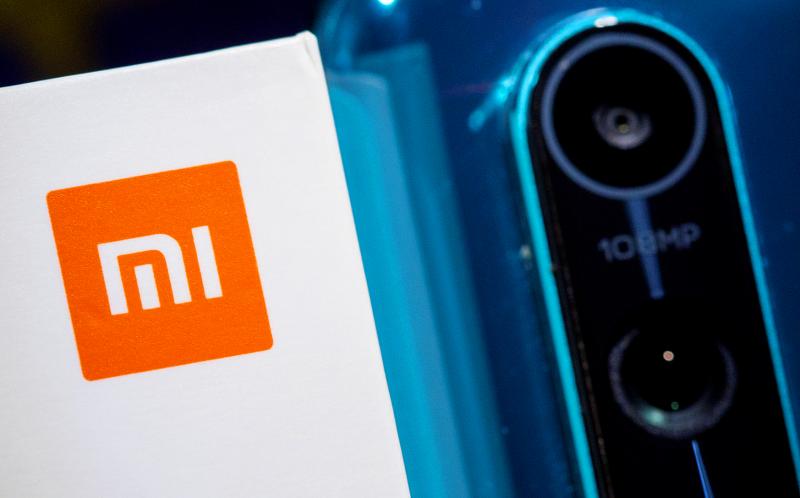Chinese smartphone maker Xiaomi Corp’s (小米) Mi 10T 5G smartphones have built-in censorship capabilities and can transmit user data to servers at its Beijing headquarters, the National Communications Commission (NCC) said on Thursday evening.
The Telecommunications Technology Center, a think tank run by the commission, conducted a test in October last year on the model sold in Taiwan after the Lithuanian National Cyber Security Center on Sept. 21 last year informed the NCC of the device’s censorship capabilities.
The Lithuanian Ministry of National Defense last year advised Lithuanians to avoid Chinese cellphones and dispose of any they own after discovering the software.

Photo: Reuters
“Our test showed that a program [MiAdBlacklisConfigur] can be downloaded from the servers of globalapi.ad.xiaomi.com through seven built-in applications on the Mi 10T 5G smartphone, which targets a long list of politically sensitive terms and can block the smartphones from linking to related Web sites. These apps can also transmit users’ Web history to servers in Beijing,” the NCC said in a statement.
The software can detect and block terms such as “Free Tibet,” “Taiwan independence” and “independent media in Hong Kong,” or terms related to the Tiananmen Square Massacre, former Chinese president Hu Jintao (胡錦濤), President Tsai Ing-wen (蔡英文), former president Lee Teng-hui (李登輝), the Liberty Times (the Taipei Times’ sister newspaper), the Chinese Nationalist Party (KMT) and the Democratic Progressive Party, the commission’s test showed.
The NCC said it expressed its concern over the software to Xiaomi Taiwan on the same day it was informed by Lithuania.
NCC said the company told it in an e-mail that the 10T smartphones sold in Taiwan are different from those in Europe, and assured the agency that the devices Taiwanese consumers purchase do not monitor or censor users’ communications, or restrict their Internet searches.
“Judging from the test results, we will continue our investigations to determine if Xiaomi Taiwan has compromised the interests of Taiwanese users by invading their privacy. We will inform relevant agencies if the company contravenes regulations enforced by other administrative authorities,” the commission said.
The NCC unveiled its test results so that the public can know the personal privacy risks of using Xiaomi smartphones, it said.
Article 14 of China’s National Intelligence Law stipulates that Chinese citizens and enterprises are obligated to support, assist and cooperate with national intelligence work, the NCC said.
Unlike smartphones made by other manufacturers, the 10T devices do not allow users to turn off tracking functions, the commission said.
Although targeted terms have been removed from the company’s servers, the manufacturer could remotely reinstall the software, it said.
Xiaomi said that it “has never, and will never” limit, block or collect data when users conduct searches, make calls, browse the Internet or use third-party communication platforms and software.
The company said that the MiAdBlacklistConfig file manages paid advertisements for Xiaomi apps, adding that it also protects users from inappropriate content, such as hate speech, or depictions of violence, sex and information that might prove offensive to local users.
Such software is widely used by smartphone companies and social media platforms, it said, citing Facebook’s and Google’s advertisement policies.
Xiaomi is dedicated to the protection of its users’ privacy and data security, it said, adding that it uses the highest standards to regulate its operations and fully complies with local and regional laws and regulations.
Additional reporting by Yang Mien-chieh

The Central Election Commission has amended election and recall regulations to require elected office candidates to provide proof that they have no Chinese citizenship, a Cabinet report said. The commission on Oct. 29 last year revised the Measures for the Permission of Family-based Residence, Long-term Residence and Settlement of People from the Mainland Area in the Taiwan Area (大陸地區人民在台灣地區依親居留長期居留或定居許可辦法), the Executive Yuan said in a report it submitted to the legislature for review. The revision requires Chinese citizens applying for permanent residency to submit notarial documents showing that they have lost their Chinese household record and have renounced — or have never

A magnitude 5.6 earthquake struck off the coast of Yilan County at 12:37pm today, with clear shaking felt across much of northern Taiwan. There were no immediate reports of damage. The epicenter of the quake was 16.9km east-southeast of Yilan County Hall offshore at a depth of 66.8km, Central Weather Administration (CWA) data showed. The maximum intensity registered at a 4 in Yilan County’s Nanao Township (南澳) on Taiwan’s seven-tier scale. Other parts of Yilan, as well as certain areas of Hualien County, Taipei, New Taipei City, Taoyuan, Hsinchu County, Taichung and Miaoli County, recorded intensities of 3. Residents of Yilan County and Taipei received

Taiwan has secured another breakthrough in fruit exports, with jujubes, dragon fruit and lychees approved for shipment to the EU, the Ministry of Agriculture said yesterday. The Animal and Plant Health Inspection Agency on Thursday received formal notification of the approval from the EU, the ministry said, adding that the decision was expected to expand Taiwanese fruit producers’ access to high-end European markets. Taiwan exported 126 tonnes of lychees last year, valued at US$1.48 million, with Japan accounting for 102 tonnes. Other export destinations included New Zealand, Hong Kong, the US and Australia, ministry data showed. Jujube exports totaled 103 tonnes, valued at

BIG SPENDERS: Foreign investors bought the most Taiwan equities since 2005, signaling confidence that an AI boom would continue to benefit chipmakers Taiwan Semiconductor Manufacturing Co’s (TSMC, 台積電) market capitalization swelled to US$2 trillion for the first time following a 4.25 percent rally in its American depositary receipts (ADR) overnight, putting the world’s biggest contract chipmaker sixth on the list of the world’s biggest companies by market capitalization, just behind Amazon.com Inc. The site CompaniesMarketcap.com ranked TSMC ahead of Saudi Aramco and Meta Platforms Inc. The Taiwanese company’s ADRs on Tuesday surged to US$385.75 on the New York Stock Exchange, as strong demand for artificial intelligence (AI) applications led to chip supply constraints and boost revenue growth to record-breaking levels. Each TSMC ADR represents